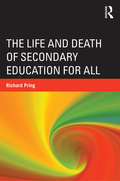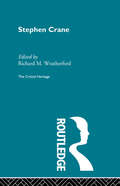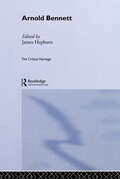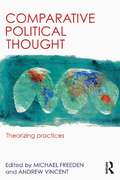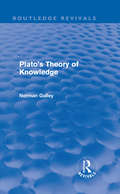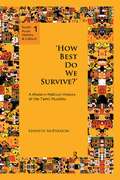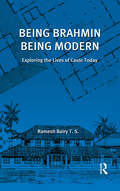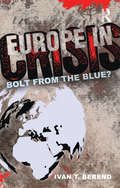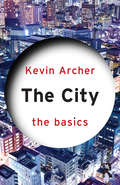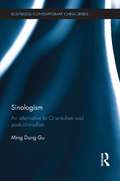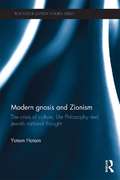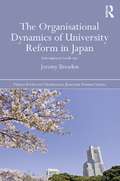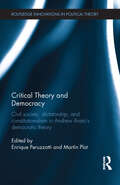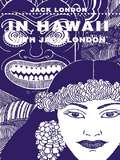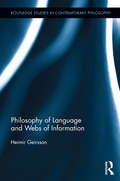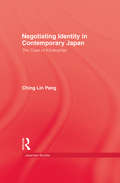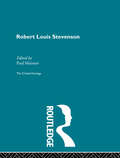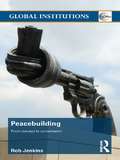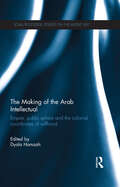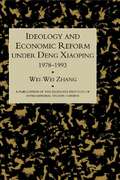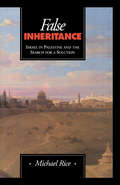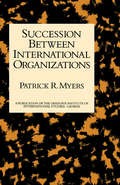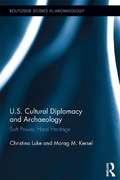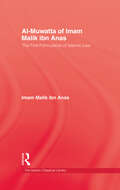Special Collections
Benetech’s Global Certified Accessible Titles
Description: Benetech’s GCA program is the first independent third-party EPUB certification to verify ebook accessibility. By creating content that is born accessible, publishers can meet the needs of all readers. Learn more: https://bornaccessible.benetech.org/
- Table View
- List View
The Life and Death of Secondary Education for All
by Richard PringIs there life after death for secondary education? This book focuses upon the quality of learning. ‘Reform’, so called, too often begins with qualifications, examinations, institutional provision, paths of progression. All those are very important, but their value lies in the support they give to learners and their learning in its different forms. One needs to start with the aims of education and then with what it means to learn (practically, theoretically, morally) and with the very many different needs of the learners. That is what this book aims to do. In so doing, it will be both philosophical in analysis and empirical in example. So much is happening ‘from down below’ that goes unrecognised by policy makers. But innovations too often get hampered by government interventions, by a bureaucratic mentality and by failure to spread good practice. The general argument of the book, therefore, will be illustrated throughout with detailed references to practical developments in schools, colleges, the third sector, youth work, independent training providers and professional bodies – across several countries. The book builds on Education for All, which was based on 14-19 research into secondary education, this book transcends the particularities of England and Wales and digs more deeply into those issues which are at the heart of educational controversy, policy and practices and which survive the transience of political change and controversy. The issues (the aims of education, standards of performance, the consequent vision of learning, the role of teachers, progression from school to higher or further education and into employment, the provision of such education and training and the control of education) are by no means confined to the UK, or to this day and age. Pring identifies similar problems in other countries such as the USA, Germany and France – and indeed in the Greece of Plato and Aristotle and offers solutions with a comparative perspective. It is a critical time. Old patterns of education and its provision are less and less suitable for facing the twenty-first century. The patterns and modes of communication have changed radically in a few years and those changes are quickening in pace. The economic context has been transformed, affecting the skills and knowledge needed for employment. The social world of young people raises fresh demands, hopes and fears. A global recession has affected young people disproportionately making quality of life and self-fulfilment ever more difficult to attain. In addressing ‘learning’ and the ‘learners’ first and foremost, the book will argue for a wider vision of learning and a more varied pattern of provision. Old structures must give way to new.
Stephen Crane
by Richard M. WeatherfordThis set comprises 40 volumes covering 19th and 20th century European and American authors. These volumes will be available as a complete set, mini boxed sets (by theme) or as individual volumes. This second set compliments the first 68 volume set of Critical Heritage published by Routledge in October 1995.
Arnold Bennett
by James HepburnThis set comprises fory volumes covering nineteenth and twentieth century European and American authors. These volumes will be available as a complete set, mini boxed sets (by theme) or as individual volumes. This second set compliments the first sixty-eight volume set of Critical Heritage published by Routledge in October 1995.
Comparative Political Thought
by Michael Freeden and Andrew VincentThis edited book introduces students and scholars to Comparative Political Thought. Featuring contributions from an excellent international line-up of esteemed scholars it examines some of the following issues: Is political theory 'Western-centric'? What can we learn from non-Western traditions of political thought? How do we compare different strands of national and regional political thought? Political thought in China, India, the Middle East and Latin America Islamic political thought Political thought in the wake of post-colonialism This is a much-needed overview of this key emerging area and will be of interest to all tsudents of political theory, thought and philosophy.
Plato's Theory of Knowledge
by Norman GulleyFirst published in 1962, this book provides a systematic account of the development of Plato’s theory of knowledge. Beginning with a consideration of the Socratic and other influences which determined the form in which the problem of knowledge first presented itself to Plato, the author then works through the dialogues from the Meno to the Laws and examines in detail Plato’s progressive attempts to solve the problem.
'How Best Do We Survive?'
by Kenneth McPhersonThis book traces the social and political history of the Muslims of south India from the later nineteenth century to Independence in 1947, and the contours that followed. It describes a community in search of political survival amidst an ever-changing climate, and the fluctuating fortunes it had in dealing with the rise of Indian nationalism, the local political nuances of that rise, and its own changing position as part of the wider Muslim community in India. The book argues that Partition and the foundation of Pakistan in 1947 were neither the goal nor the necessarily inescapable result of the growth of communal politics and sentiment, and analyses the post-1947 constructions of events leading to Partition. Neither the fact of Muslim communalism per se before 1947 nor the existence of separate Muslim electorates provide an explanation for Pakistan. The book advances the theory that micro-level studies of the operation of the former, and the defence of the latter, in British India can lead to a better understanding of the origins of communalism. The book makes an important contribution to understanding and dealing with the complexities of communalism — be it Hindu, Muslim or Christian — and its often tragic consequences.
Being Brahmin, Being Modern
by Ramesh BairyThere is clearly an academic and political obsession with the ‘idea’ of the Brahmin. There is also, simultaneously, a near-complete absence of engagement with the Brahmin as an embodied person or community. This book addresses this intriguing paradox by making available a sociological description of the Brahmins in today’s Karnataka. It pursues three distinct, yet enmeshed, registers of inquiry – the persona of the ‘Brahmin’ embodied in the agency of the individual Brahmin; the organised complexes of action such as the caste association and the public culture of print; and finally, taking off from a longer (yet, modern and contemporary) history of non-Brahminical othering of the Brahmin. It argues that we tend to understand the contemporaneity of caste almost exclusively within the twin registers of legitimation–contestation and dominance–resistance. While these facets continue to be salient, there is also a need to push out into hitherto neglected dimensions of caste. The book focuses attention on the many lives of modern caste — its secularisation, the subject positions that it offers, the equivocations by which persons and communities become ‘subjects’ of caste, their differential investments in the caste-self.
Roman Political Institutions
by Leon HomoOriginally published between 1920-70,The History of Civilization was a landmark in early twentieth century publishing. It was published at a formative time within the social sciences, and during a period of decisive historical discovery. The aim of the general editor, C.K. Ogden, was to summarize the most up to date findings and theories of historians, anthropologists, archaeologists and sociologists. This reprinted material is available as a set or in the following groupings: * Prehistory and Historical Ethnography Set of 12: 0-415-15611-4: £800.00 * Greek Civilization Set of 7: 0-415-15612-2: £450.00 * Roman Civilization Set of 6: 0-415-15613-0: £400.00 * Eastern Civilizations Set of 10: 0-415-15614-9: £650.00 * Judaeo-Christian Civilization Set of 4: 0-415-15615-7: £250.00 * European Civilization Set of 11: 0-415-15616-5: £700.00
Europe in Crisis
by Ivan BerendThis book analyzes the European Great Recession of 2008-12, its economic and social causes, its historical roots, and the policies adopted by the European Union to find a way out of it. It contains explicit debates with several economists and analysts on some of the most controversial questions about the causes of the crisis and the policies applied by the European Union. It presents the cases of Iceland, Greece and Ireland, the countries that first declined into crisis in Europe, each of them in a different way. Iceland is a case study for reckless banking practices, Greece of reckless public spending, and Ireland of reckless household indebtedness. At least seven other countries, mostly from the peripheries of Europe, had similarly reckless banking and spending practices. In the center of the book are the economic and social causes of the crisis. Contemporary advanced capitalism became financialized, de-industrialized and globalized and got rid of the "straitjacket" of regulations. Solid banking was replaced by high-risk, "casino-type" activity. The European common currency also had a structural problem — monetary unification without a federal state and fiscal unification. The other side of the same coin is European hyper-consumerism. A new lifestyle emerged during two super-prosperous periods in the 1950s to 1960s, and during the 1990s to 2006. Trying to find an exit policy, the European Union turned to strict austerity measures to curb the budget deficit and indebtedness. This book critically analyzes the debate around austerity policy. The creation of important supra-national institutions, and of a financial supervisory authority and stability mechanisms, strengthens integration. The correction of the euro’s structural mistake by creating a quasi-fiscal unification is even more important. The introduction of mandatory fiscal rules and their supervision promises a long-term solution for a well-functioning common currency. These measures, meanwhile, create a two-tier European Union with a fast-track core. This book suggests that the European Union will emerge stronger from the crisis. This book will be of particular interest to students and researchers of economics, history, political science and international finance, but will also prove profitable reading for practitioners and the interested public.
The City
by Kevin ArcherThe City: The Basics provides a brief yet compelling overview of the study of cities and city life. The book draws on a range of perspectives – economic, political, cultural, and environmental aspects are all considered – to provide a broad comparison of the evolution of cities in the rich Global North and the poorer Global South. Topics covered in the book include: a brief history of cities from ancient times to the post-modern present the differences between "global cities" in the North and "megacities" in the South the environmental impact of urban life and the idea of sustainable cities urban planning, urban politics and urban poverty. Featuring suggestions for further reading, recommended websites and a number of maps and illustrations, this is the ideal starting point for those interested in any aspect of cities or urban studies.
Sinologism
by Ming Dong GuWhy, for centuries, have the West and the world continuously produced China knowledge that deviates from Chinese realities? Why, since the mid-nineteenth century, have Chinese intellectuals oscillated between commendation and condemnation of their own culture, and between fetishization and demonization of all things Western? And why have some of the world’s wisest thinkers expressed opinions on Chinese culture, which are simply wrong? In order to answer these questions, this book explores the process of knowledge production about China and the Chinese civilization and in turn, provides a critique of the ways in which this knowledge is formed. Ming Dong Gu argues that the misperceptions and misinterpretations surrounding China and the Chinese civilisation do not simply come from misinformation, biases, prejudices, or political interference, but follow certain taken-for-granted principles that have evolved into a cultural unconscious. Indeed, Gu argues that the conflicting accounts in China-West studies are the inevitable outcome of this cultural unconscious which constitutes the inner logic of a comprehensive knowledge system which he terms ‘Sinologism’. This book explores Sinologism’s origin, development, characteristics, and inner logic, and critiques its manifestations in the writings of Chinese, Western, and non-Western thinkers and scholars, including Montesquieu, Herder, Hegel, Marx, Weber, Russell, Pound, Wang Guowei, Guo Moruo, Gu Jiegang, Wen Yiduo, and many others in diverse disciplines from arts and humanities to social sciences. In doing so, Gu demonstrates why the existing critical models are inadequate for Chinese materials and makes an attempt to construct an alternative theory to Orientalism and postcolonialism for China-West studies and cross-cultural studies. Sinologism crosses over the subjects of history, thought, literature, language, art, archaeology, religion, aesthetics and cultural theory, and will appeal to students and scholars of East-West studies with a particular focus on China, as well as those interested in cultural theory more broadly.
Modern Gnosis and Zionism
by Yotam HotamIn the late nineteenth and early twentieth century, the German intellectual world was challenged by a growing distrust in the rational ideals of the enlightenment, and consequently by a belief in the existence of a radical ‘cultural crisis’. One response to this crisis was the emergence of ‘Life Philosophy’, which celebrated the irrational, expressive, instinctive and spontaneous, while rejecting the rational, conscious, and logical. Around the same time and place, Zionist thought crystallized. It discussed issues like the ‘Jewish essence’, the creation of a new Jewish person and a new Jewish community, return to the Jewish homeland, and the negation of the diasporic way of life. This book explores the connections between Zionism and Life Philosophy, and argues that Life Philosophy represents a modern secularized version of gnostic dualism between God and world, and that this was a particular secular impulse that lay at the core of the Zionist political mission. Consisting of two main sections, the book first shows the manner in which Life Philosophy should be understood as a modern, secularized, gnostic theology, before concluding by discussing its political Zionist interpretation. Drawing on published works of a wide range of thinkers and intellectuals, alongside a variety of unpublished materials, this book will be welcomed by students and scholars of Jewish studies, the philosophy of Judaism, and religion and philosophy more generally.
The Organisational Dynamics of University Reform in Japan
by Jeremy BreadenFor several decades internationalisation has been a cornerstone of both Japanese government higher education policy and approaches to reform at an institutional level, but Japan has still not managed to lose its reputation as a somewhat reclusive member of the global academic community. Consensus on the potential of internationalisation to reinvigorate Japanese higher education is matched by the depth of recognition that universities have, to date, failed to internationalise successfully. This book offers a new approach to Japan’s internationalisation conundrum by proceeding from the ‘inside out’. It presents an extended case study one university organisation that has been changed through its adoption of a radical program of internationalisation. Through this case study Jeremy Breaden identifies patterns by which internationalisation is situated in administrative discourse and individual action, and determines how these patterns in turn shape organisational practice. The result is a multi-dimensional narrative of organisational change that advances our understanding of both the dynamics of university reform and the concept of internationalisation, one of the most durable yet contentious themes in the study of contemporary Japanese society. With detailed analysis and an in-depth case study, this book will be of interest to students and scholars of Japanese studies, sociology and anthropology. It will also prove valuable to professionals and policy makers working in higher education, both in Japan and around the world.
Critical Theory and Democracy
by Martín Plot and Enrique PeruzzottiThis book focuses on Andrew Arato’s democratic theory and its relevance to contemporary issues such as processes of democratization, civil society, constitution-making, and the modern Executive. Andrew Arato is -both globally and disciplinarily- a prominent thinker in the fields of democratic theory, constitutional law, and comparative politics, influencing several generations of scholars. This is the first volume to systematically address his democratic theory. Including contributions from leading scholars such as Dick Howard, Ulrich Preuss, Hubertus Buchstein, Janos Kis, Uri Ram, Leonardo Avritzer, Carlos de la Torre, and Nicolás Lynch, this book is organized around three major areas of Arato´s influence on contemporary political and social thought. The first section offers a comprehensive view of Arato’s scholarship from his early work on critical theory and Western Marxism to his current research on constitution-making and its application. The second section shifts its focus from the previous, comprehensive approach, to a much more specific one: Arato´s widespread influence on the study of civil society in democratization processes in Latin America. The third section includes a previously unpublished work, ‘A conceptual history of dictatorship (and its rivals,)’ one of the few systematic interrogations on the meaning of a political form of fundamental relevance in the contemporary world. Critical Theory and Democracy will be of interest to critical and social theorists, and all Arato scholars.
In Hawaii
by LondonPublished in the year 2001, In Hawaii is a valuable contribution to the field of Social Science.
Philosophy of Language and Webs of Information
by Heimir GeirssonThe nature of propositions and the cognitive value of names have been the focal point of philosophy of language for the last few decades. The advocates of the causal reference theory have favored the view that the semantic contents of proper names are their referents. However, Frege’s puzzle about the different cognitive value of coreferential names has made this identification seem impossible. Geirsson provides a detailed overview of the debate to date, and then develops a novel account that explains our reluctance, even when we know about the relevant identity, to substitute coreferential names in both simple sentences and belief contexts while nevertheless accepting the view that the semantic content of names is their referents. The account focuses on subjects organizing information in webs; a name can then access and elicit information from a given web. Geirsson proceeds to extend the account of information to non-referring names, but they have long provided a serious challenge to the causal reference theorist.
Negotiating Identity In Contemporary Japan
by PangFirst published in 2000. Routledge is an imprint of Taylor & Francis, an informa company.
Robert Louis Stevenson
by Paul MaixnerFirst Published in 1995. Routledge is an imprint of Taylor & Francis, an informa company.
Peacebuilding
by Robert JenkinsThe emergence of The United Nations Peacebuilding Commission (PBC) in 2005 was the culmination of a long and contentious process. In this work Rob Jenkins provides a concise introduction that traces the origins and evolution of peacebuilding as a concept, the creation and functioning of the PBC as an institution, and the complicated relationship between these two processes. Jenkins discusses how continued contestation over what exactly peacebuilding is, and how its objectives can most effectively be achieved, influenced the institutional design and de facto functioning of the PBC, its structure, mandate and origins. He then moves on to examine the peacebuilding architecture in action and analyses the role that the PBC has carved out for itself, reflecting on the future prospects for the organization. The theory and practice of peacebuilding has assumed increasing importance over the last decade, and this work is essential reading for all students of conflict resolution, peace studies and international relations.
The Making of the Arab Intellectual
by Dyala HamzahIn the wake of the Ottoman Empire’s nineteenth-century reforms, as guilds waned and new professions emerged, the scholarly ‘estate’ underwent social differentiation. Some found employment in the state’s new institutions as translators, teachers and editors, whilst others resisted civil servant status. Gradually, the scholar morphed into the public writer. Despite his fledgling status, he catered for the public interest all the more so since new professionals such as doctors, engineers and lawyers endorsed this latest social role as an integral part of their own self-image. This dual preoccupation with self-definition and all things public is the central concern of this book. Focusing on the period after the tax-farming scholar took the bow and before the alienated intellectual prevailed on the contemporary Arab cultural scene, it situates the making of the Arab intellectual within the dysfunctional space of competing states’ interests known as the ‘Nahda’. Located between Empire and Colony, the emerging Arab public sphere was a space of over- and under-regulation, hindering accountability and upsetting allegiances. The communities that Arab intellectuals imagined, including the Pan-Islamic, Pan-Arab and socialist sat astride many a polity and never became contained by post-colonial states. Examining a range of canonical and less canonical authors, this interdisciplinary approach to The Making of the Modern Arab Intellectual will be of interest to students and scholars of the Middle East, history, political science, comparative literature and philosophy.
Ideology & Econ Refor Under Deng
by ZhangFirst published in 1996. Routledge is an imprint of Taylor & Francis, an informa company.
False Inheritance
by RiceFirst Published in 1994. Routledge is an imprint of Taylor & Francis, an informa company.
Succession Between Internl Organ
by MyersFirst Published in 1993. Routledge is an imprint of Taylor & Francis, an informa company.
US Cultural Diplomacy and Archaeology
by Christina Luke and Morag KerselArchaeology’s links to international relations are well known: launching and sustaining international expeditions requires the honed diplomatic skills of ambassadors. U.S. foreign policy depends on archaeologists to foster mutual understanding, mend fences, and build bridges. This book explores how international partnerships inherent in archaeological legal instruments and policies, especially involvement with major U.S. museums, contribute to the underlying principles of U.S. cultural diplomacy. Archaeology forms a critical part of the U.S. State Department’s diplomatic toolkit. Many, if not all, current U.S.-sponsored and directed archaeological projects operate within U.S. diplomatic agendas. U.S. Cultural Diplomacy and Archaeology is the first book to evaluate museums and their roles in presenting the past at national and international levels, contextualizing the practical and diplomatic processes of archaeological research within the realm of cultural heritage. Drawing from analyses and discussion of several U.S. governmental agencies’ treatment of international cultural heritage and its funding, the history of diplomacy-entangled research centers abroad, and the necessity of archaeologists' involvement in diplomatic processes, this seminal work has implications for the fields of cultural heritage, anthropology, archaeology, museum studies, international relations, law, and policy studies.
Al-Muwatta Of Iman Malik Ibn Ana
by AnasFirst published in 1989. Routledge is an imprint of Taylor & Francis, an informa company.
